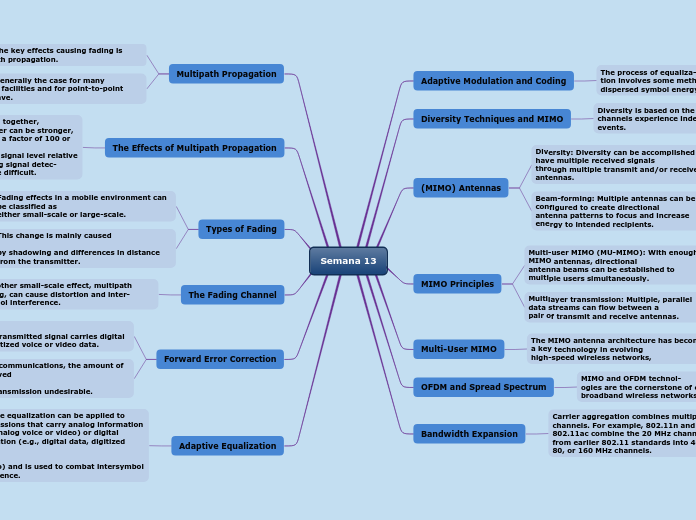Semana 13
Adaptive Modulation and Coding
The process of equaliza-
tion involves some method of gathering the dispersed symbol energy
Diversity Techniques and MIMO
Diversity is based on the fact that individual channels experience independent fading
events.
(MIMO) Antennas
Diversity: Diversity can be accomplished to have multiple received signals
through multiple transmit and/or receive antennas.
Beam-forming: Multiple antennas can be configured to create directional
antenna patterns to focus and increase energy to intended recipients.
MIMO Principles
Multi-user MIMO (MU-MIMO): With enough MIMO antennas, directional
antenna beams can be established to multiple users simultaneously.
Multilayer transmission: Multiple, parallel data streams can flow between a
pair of transmit and receive antennas.
Multi-User MIMO
The MIMO antenna architecture has become a key technology in evolving
high-speed wireless networks,
OFDM and Spread Spectrum
MIMO and OFDM technol-
ogies are the cornerstone of emerging broadband wireless networks.
Bandwidth Expansion
Carrier aggregation combines multiple channels. For example, 802.11n and
802.11ac combine the 20 MHz channels from earlier 802.11 standards into 40,
80, or 160 MHz channels.
Multipath Propagation
One of the key effects causing fading is multipath propagation.
This is generally the case for many
satellite facilities and for point-to-point microwave.
The Effects of Multipath Propagation
As multipath signals add together,
the resulting signal power can be stronger, but can also be lower by a factor of 100 or
1000 (20 or 30 dB). The signal level relative to noise declines, making signal detec-
tion at the receiver more difficult.
Types of Fading
Fading effects in a mobile environment can be classified as
either small-scale or large-scale.
This change is mainly caused
by shadowing and differences in distance from the transmitter.
The Fading Channel
The other small-scale effect, multipath fading, can cause distortion and inter-
symbol interference.
Forward Error Correction
those in
which the transmitted signal carries digital data or digitized voice or video data.
in satellite communications, the amount of delay involved
makes retransmission undesirable.
Adaptive Equalization
Adaptive equalization can be applied to transmissions that carry analog information
(e.g., analog voice or video) or digital information (e.g., digital data, digitized voice
or video) and is used to combat intersymbol interference.
